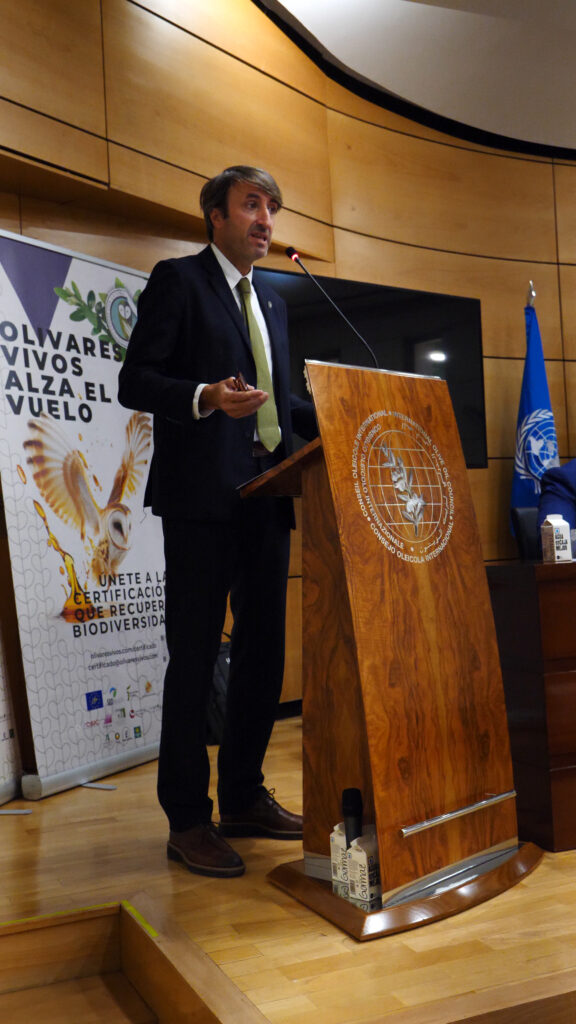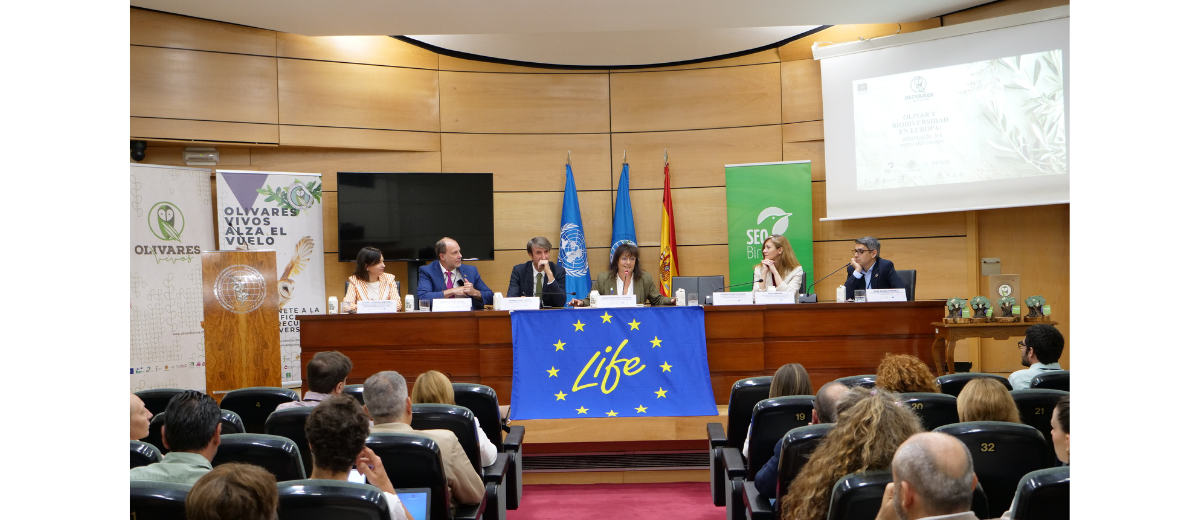Within the EU’s LIFE project, Olivares Vivos+ is the largest study on the olive grove’s biodiversity
Today, the pioneering results of the LIFE Olivares Vivos+ project were presented at the headquarters of the International Olive Council (IOC). This initiative, aimed at enhancing biodiversity and sustainability in olive groves through the implementation of environmentally friendly agricultural practices, clearly demonstrated the high ecological value of olive groves for conserving biodiversity in Europe.
In a landmark presentation, Olivares Vivos+ unveiled the results from more than 1,600 taxa and 330,000 registered records across olive groves from four Mediterranean countries that underline the olive grove’s role as a strategic crop for the conservation of our natural heritage. The project, developed in Spain, Portugal, Italy and Greece, highlights the significant ecological importance of olive groves in preserving biodiversity across Europe and beyond. Launched in 2015 under the framework of the European Union’s (EU) LIFE projects, Olivares Vivos+ is coordinated by SEO/BirdLife, conducted by the University of Jaén and the Spanish National Research Council (CSIC), and counts on the IOC’s support, inter alia, since 2021. The study underscores the unquestionable value of olive groves for preserving biodiversity, shedding light on the serious impact of agricultural intensification on the diversity of flora and fauna and helping researchers understand the consequences of increasing climate aridity on the diversity and composition of biological communities.
 On the occasion of the results presentation of Olivares Vivos+, Jaime Lillo, IOC Executive Director, stated that “Today we are presenting the results of the largest study on olive biodiversity to date, as part of the European Union’s LIFE project, Olivares Vivos+. This initiative shows that agriculture, biodiversity and environment can be mutually reinforcing, particularly in an environment where we all have to face the challenge of climate change.”
On the occasion of the results presentation of Olivares Vivos+, Jaime Lillo, IOC Executive Director, stated that “Today we are presenting the results of the largest study on olive biodiversity to date, as part of the European Union’s LIFE project, Olivares Vivos+. This initiative shows that agriculture, biodiversity and environment can be mutually reinforcing, particularly in an environment where we all have to face the challenge of climate change.”
SEO/BirdLife Executive Director, Asunción Ruiz, highlighted that “Today we are taking another step towards the necessary change in the agrifood model. And we do it with science, because thanks to the data we can propose productive systems that generate profitability by promoting biodiversity. Olivares Vivos crosses borders and, now more than ever, supports the Europe that society needs, which goes hand in hand with nature as the only guarantee for the future.”
“It is true that sustainability is fully integrated into business and political discourse, but it is time to take action. And Olivares Vivos is a proven tool to start on this path. Because biodiversity, in addition to being a fundamental pillar of sustainability, is its best indicator. Biodiversity is sustainability that can be seen, smelled, heard and felt,” remarked José Eugenio Gutiérrez, Director of LIFE Olivares Vivos+.
Diving into the project’s results, Pedro J. Rey, Ecology Professor at the University of Jaén, underscored that “There is also a geographical and regional segregation in the identity of taxa (species, genera), which means a remarkable renewal of them along this geographical gradient, which contributes to increase the overall diversity, and which is compatible with geographical and deforestation gradients typical of the Mediterranean.”
On the CSIC’s behalf, technician Rubén Tarifa added: “With these new data, Olivares Vivos has combined the results of both LIFE projects, obtaining the most complete vision ever achieved of the biodiversity of the olive grove in general and, in particular, in the Iberian Peninsula, which, with more than 3 million hectares, is home to more than 50% of the European olive grove.” “This makes us optimistic about managing biodiversity in olive landscapes in the face of increasing aridity due to climate change, since the agri-environmental scheme of the Olivares Vivos model, which already works by recovering biodiversity in relatively mild conditions, will also do so in semi-arid conditions” said Francisco Valera, CSIC scientist at the Experimental Station of Arid Zones.
Present at the tribune were also Francés Boya, Secretary General for the Demographic Challenge of the Ministry of Ecological Transition and the Demographic Challenge; Paz Fentes, Deputy Director General of Herbaceous and Industrial Crops and Olive Oil of the Ministry of Agriculture, Fisheries and Food; Isabel Uceda, Deputy for the Environment of the Provincial Council of Jaén; José María Martell, Vice President of Scientific and Technical Research of the CSIC; and Nicolás Ruiz, Rector of the University of Jaén.
Also participating in the presentation day by video were the Spanish Minister of Agriculture, Fisheries and Food, Luis Planas; the Director of Biodiversity and Natural Capital in the European Commission’s Directorate General for the Environment, Humberto Delgado; and Mariana de Gracia Canales Duque, Deputy Minister of Common Agricultural Policy and Agro-environmental Policy of the Regional Government of Castilla-La Mancha.
 Since 2015, Olivares Vivos, funded by two LIFE projects, has developed an innovative olive growing model through collaboration among farmers, scientists, and conservationists. Among other actions, the current LIFE Olivares Vivos+ project (2021-2026) aims to accelerate the dissemination of this model across major European olive-growing regions, extend it to other products like table olives, and adapt it to crops such as almond trees, vineyards, and rainfed arable crops.
Since 2015, Olivares Vivos, funded by two LIFE projects, has developed an innovative olive growing model through collaboration among farmers, scientists, and conservationists. Among other actions, the current LIFE Olivares Vivos+ project (2021-2026) aims to accelerate the dissemination of this model across major European olive-growing regions, extend it to other products like table olives, and adapt it to crops such as almond trees, vineyards, and rainfed arable crops.
The LIFE Olivares Vivos+ project is developed by SEO/BirdLife as the coordinating partner, along with the Provincial Council of Jaén, the University of Jaén, the Experimental Station of Arid Zones (EEZA) of the CSIC (EEZA-CSIC), the University of Évora, the agricultural and forestry cooperative DREAM-Italia, the Helena Agricultural Organization, and Juan Vilar Consultores Estratégicos. The project is financed by the LIFE program of the European Commission and is also co-financed by the Provincial Council of Jaén and the Ministry of Agriculture, Livestock, Fisheries, and Sustainable Development of the Regional Government of Andalusia, with additional financial support from the Interprofessional Association of Spanish Olive Oil, the Regional Government of Castilla-La Mancha, and the Caja Rural de Jaén.
The International Olive Council, the only international, intergovernmental organization dedicated to the world’s olive groves, has supported the LIFE Olivares Vivos+ project since 2021 through the dissemination of the initiative’s results.









